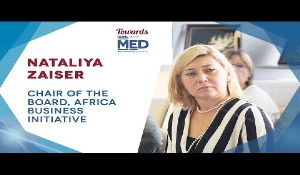Diasporia News of Monday, 14 October 2019
Source: Kester Kenn Klomegah
Effective media cooperation could boost Russia-African business
Ahead of the upcoming Russia-Africa Summit in Sochi, Russia experts and academics have consistently called for forging media cooperation as an instrument for promoting business opportunities and positive perception, and knowledge about post-Soviet achievements in Russia and developments in Africa.
Professor Irina Abramova, Director of the Institute for African Studies under the Russian Academy of Sciences, said in the eyes of the Russian political establishment and business community, Africa is still viewed as a continent of poverty, endless wars and epidemics, stuck in the pre-industrial stage of development, and surviving only thanks to international aid.
Meanwhile, there is a different Africa, she maintains, Africa with rapid economic growth, dynamic formation of democratic management systems, modern structures and institutions of a market economy, a major player in the market of natural and human resources, a key source of growth in global demands and profitable spheres of investment operations.
"The media should more actively inform Russians about the prospects for the development of the African continent, its history and culture. Unfortunately, the Russian man in the street does not know much about Africa," the director explained.
"For Africans, so far Russia is associated with the Soviet Union, the majority of Africans still have very warm feelings towards Russia. But in general, the Russian Federation in Africa, and Africa in the Russian Federation are very poorly represented in the media. It is necessary to organize a special media entirely dedicated to Russia-Africa," Abramova suggested.
Olga Kulkova, Research Fellow of the Center for Development and Security Studies, Faculty of World Politics, Moscow State University, has acknowledged that Russia is back to Africa, Africa truly is a continent of new opportunities and there is huge potential here for developing economic ties.
She, however, urged Russia to share its scientific and cultural achievements with the African people and boost the prestige of the Russian language on the continent.
Kulkova said "Africa needs broader coverage in Russian media. Leading Russian media agencies should release more topical news items and quality analytical articles about the continent in order to adequately collaborate with African partners and attract Russian business to Africa. More quality information about modern Russia should be broadcast in African states. Indisputably, it would take a lot of money and efforts, but the result will pay off."
Lyubov Demidova, Deputy Chairperson of the Regional Chamber of Commerce and Industry in Moscow Region, reiterated that Russia is now aiming to raise its relations with Africa than before and media could serve as a good purpose for the development of fruitful cooperation in various fields.
Over the years, one of the key challenges and problems facing Russian companies and investors has been insufficient knowledge of the economic potential, on the part of Russian entrepreneurs, the needs and business opportunities of the African region, she pointed out.
Lack of effective and frequent interaction in order to understand the capabilities and needs of each other leading to the development of the economy both with Russian and with the African side, she added as another obstacle which stands on the way for sustainable cooperation.
Nataliya Zaiser, Founder and CEO of the Africa Business Initiative (ABI), a business NGO created to support relations between Russia and Africa, explained in an interview that the time has changed significantly so it is necessary to find absolutely different approaches and strategies to building business relationships.
For Africa in particular, the Africa Business Initiative offers the chance of a consolidated approach, and an independent organization to work with the business community in Russia and at the same time combine the interests of the African entrepreneurs.
On the other hand, she explains that Africa has much to offer Russia, which is a large country and has excellent prospects in the regions, many of which are developing very rapidly and are ready to accept new partnerships, and discuss forms of cooperation.
There’s a good case for creating a specific program (a roadmap if possible media program) for cooperation between African countries and the Russian regions, she said, added that the role of the media allows to assist businesses in broader cooperation, involving foreign colleagues interested in doing business in Africa.
Fyodor Lukyanov, Chairman of the Presidium of the Council on Foreign and Defence Policy, Research Director at the Valdai Discussion Club and Editor-in-Chief of the Russia in Global Affairs journal, has observed that the Russian media writes very little about Africa - what is going on there, what are the social and political dynamics in different parts of the continent.
He suggested that the media and non-governmental organizations should make big efforts to increase the level of mutual knowledge, this can stimulate interest for each other and lead to increased economic interaction, and added that "soft power has never been a strong side of Russian policy in the post-Soviet era."
Professor Vladimir Shubin, Deputy Director of the Institute for African Studies under the Russian Academy of Sciences, reminded: "Russia is not doing enough to communicate to the broad public, particularly in Africa, true information about its domestic and foreign policies as well as the accomplishments of Russian culture, the economy, science and technology in order to form a positive perception of Russia abroad and a friendly attitude towards it as stated by the new Concept of the Foreign Policy."
Entertainment










